Southern African Economic Area

Botswana, Namibia, Eswatini (Southern African Economic Area)
- Introduction to the Southern African Economic Area of the African Civilization
- Economic Profile of the Southern African Countries: Botswana, Lesotho, Namibia, Eswatini, South Africa, Zambia, and Zimbabwe
- Businesspeople of the Southern African Economic Area
- Christianity in the Southern African Economic Area
- Interactions of the Southern African Economic Area with the other African Economic Areas (West Africa, Central Africa, East Africa, Maghrebian)
- Interactions of the Southern African Economic Area with the other economic areas
- Logistics in Southern Africa
- Economic Organizations related to the Southern African Economic Area
The objectives of the subject “Southern African Economic Area” are the following:
- To define the economic characteristics of the Southern African Economic Area
- To know the economic profile of the Southern African Countries
- To understand the influence of Christianity and the African Traditional Religions on the Southern African Economic Area
- To understand the economic integration process in the Southern African Economic Area
- To analyze the main Businesspeople
- To explore the economic relationships with the others economic areas of other civilizations
- To analyze the main Economic Organizations related to the Southern African Economic Area

The Subject “Southern African Economic Area” belongs to the following Online Programs taught by EENI Global Business School:
Courses: Business in Southern Africa, Christianity & Business.
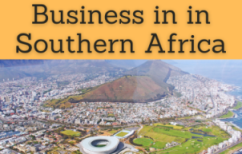
Doctorate: Ethics, Religions & Business, African Business, World Trade.
Master in Business in Africa, International Business, Foreign Trade.


EENI Partnerships with Educational Institutions
Why study “Christianity and Business”?.
Languages:  or (
or ( Africa Austral
Africa Austral  Afrique Australe
Afrique Australe  África Austral).
África Austral).
Download the syllabus “Southern African Economic Area” (PDF).
- Credits of the Subject “Southern African Economic Area”: 1

- Duration: one week
Masters adapted to the Southern African Students:  Botswana,
Botswana,
 Eswatini,
Eswatini,
 Lesotho,
Lesotho,
 Namibia,
Namibia,
 South Africa,
South Africa,
 Zambia, and
Zambia, and  Zimbabwe.
Zimbabwe.
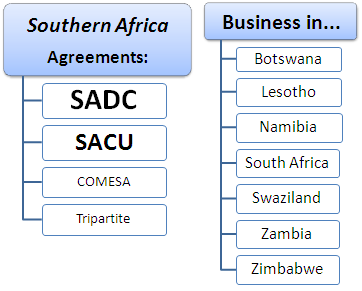
Southern African Economic Area.
The Southern African Economic Area consists of seven countries: Botswana, Eswatini, Lesotho, Namibia, South Africa, Zambia, and Zimbabwe.
- English is the main language in the Southern African region besides local languages
- The largest economic engine of Southern Africa is South Africa, the second African Economy
- The main religions in Southern Africa are Christianity and the African Traditional Religions
- the largest ports in Southern Africa are the Port of Durban and Port of Walvis Bay
- Trans-African corridors across Southern Africa are Cairo-Gaborone Corridor, Tripoli-Windhoek Corridor, Lobito Corridor, Beira-Lobito Corridor, and North-South Corridor, Asia-Africa Corridor
| Country (Capital) South Africa (Pretoria) Botswana (Gaborone) Lesotho (Maseru) Zambia (Lusaka) Zimbabwe (Harare) Namibia (Windhoek) Eswatini (Mbabane) |
Area (km²) 1,221,037 581,730 30,355 752,618 390,580 825,615 17,363 |
Population (million people) 54 2,1 1,9 14,3 12 2,3 1 |
Personalities and Businesspeople of Southern Africa: Nkosazana Dlamini-Zuma, Patrice Motsepe, Bridgette Radebe, Irene Charnley, Sifiso Dabengwa, Wendy Appelbaum, Monica Katebe Musonda, Strive Masiyiwa, Cyril Ramaphosa, Cheryl Carolus, Rapelang Rabana, and Divine Ndhlukula.
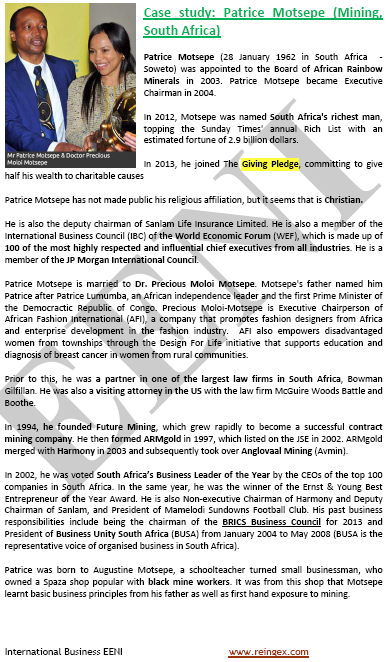

In Southern Africa there are several Regional Economic Communities:
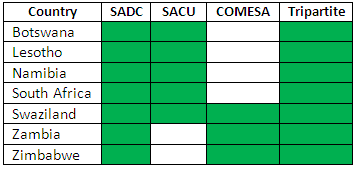


- All the Southern African Countries belong to the Southern African Development Community (SADC) and therefore are members of the COMESA-EAC-SADC Agreement (Tripartite Agreement)
- Botswana, Lesotho, Namibia, South Africa, and Eswatini are members of the Southern African Customs Union (SACU)
- Eswatini, Zambia, and Zimbabwe are members of the Common Market for Eastern and Southern Africa (COMESA)
- Zimbabwe and South Africa have a trade agreement
- Zambia is a member of the Conference on the Great Lakes
Tripartite member countries
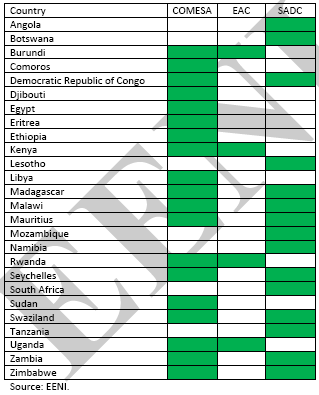
All the Southern African Countries are members of the African Development Bank, AUDA-NEPAD, African Union, and Economic Commission for Africa.
Interactions of the Southern African Economic Area with the other civilizations.
- Lesotho and Zambia are beneficiaries of the SPG of the EU
- The EU has Trade Agreements with South Africa and the SADC
- Botswana, Lesotho, Namibia, South Africa, Eswatini, Zambia, and Zimbabwe are members of the Africa-EU Partnership of the EU
- The EFTA has a trade agreement with the Southern African Customs Union (SACU)
- All the Southern African Countries, except Zimbabwe, are beneficiaries of the AGOA of the U.S.
- The MERCOSUR has a trade agreement with the SADC
- South Africa is a member of the Indian-Ocean Rim Association
- Bharat (India) has an agreement with the Southern African Customs Union
- The COMESA Countries are members of the COMESA-US Agreement
- All the Southern African Countries are beneficiaries of the Arab Bank for Economic Development in Africa (BADEA), Afro-Arab Cooperation, Summit of South American-Arab Countries, Africa-Turkey Partnership, and the Asia-Middle East Dialogue
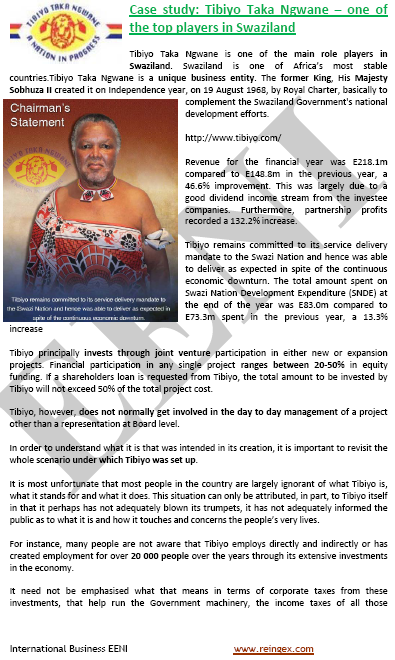

(c) EENI Global Business School (1995-2024)
We do not use cookies
Top of this page


